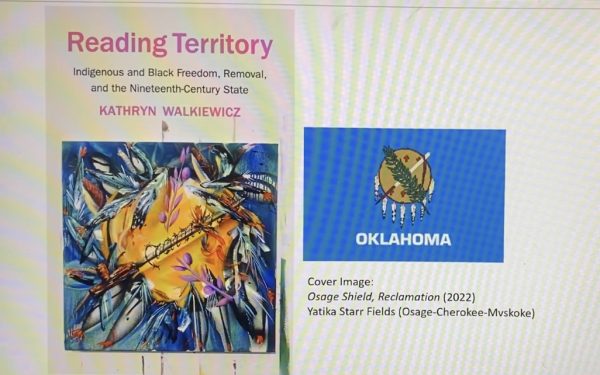It is no secret that the U.S. government’s Indian Boarding Schools have created a lasting traumatic impact on Indigenous communities. The attempt to divide and conquer Indigenous lands and people continues to scar our history.
“They try to destroy our identity with boarding schools by attacking our most vulnerable – our children,” says Shelly C. Lowe, Chair of the National Endowment for Humanities and a citizen of the Navajo Nation.
One method Indigenous people have employed to fight back against this treatment has been the publishing of Indigenous newspapers.
On Wednesday night, September 25, 2024, two very eager Indigenous voices, Lowe and Kathryn Walkiewicz were invited to speak at the Library of Congress to address the importance of Indigenous Newspapers, both today and throughout history.
Lowe began her speech speaking a few words in Navajo, before she discussed the uneven distribution of newspapers among Indigenous communities and how vital, yet overlooked, these papers are. She gave an example of these newspapers keeping Indigenous children informed about their communities while they attend school off their reservations. Her focus then shifted to emphasize the significant role Indigenous newspapers play in telling the stories of the tragic Indian Boarding School experience.
According to Lowe, there is an importance in the retelling of these events so that the Indigenous children affected are never forgotten.
“The U.S. government should work with the appropriate institutions to ensure that the American people learn the role of federal Indian boarding schools in the history of the United States,” said Lowe. “Newspapers are key here, not because they directly reveal that role, but because, often, they are an excellent reminder of the distance between what is printed in them and what people’s experiences might have been.”
After Lowe returned to her seat, Walkiewicz was introduced as a member of the Cherokee Nation and a professor of Literature, as well as the co-director of the Indigenous Futures Institute at UC San Diego. The focus of her work is on Native American and Indigenous studies, print culture, and literacy. She is also an author of several novels.
She began her speech by expressing her gratitude toward the Library of Congress for holding this event and for her invitation to speak, then revealed her speech would focus mainly on the visual aspect of the literature she was presenting.
Walkiewicz started by directing the audience’s attention toward one of her novels: Reading Territory: Indigenous and Black Freedom, Removal, and the Nineteenth-Century State (2023). More specifically, focused on the front cover of the book (shown below).

Walkiewicz explained the goal of Indigenous illustrator, Yatika Starr Fields, saying, “The painting is a reimagination of the Oklahoma state flag…Fields’ painting takes back Indigenous symbols used by the state of Oklahoma on the official flag…In the image, the arrow was wrapped by barbed wire signifying occupation of land. And the olive branch is broken, evoking Oklahoma’s broken promises with the approximately 40 distinct tribal nations.”
Her focus then shifted to the layout of Indigenous newspapers, with the Cherokee Phoenix as an example, which was founded in 1828. It was printed in both English and Cherokee: a symbolic inference that if both languages could harmoniously coexist on the pages of a newspaper, the Cherokee Nation and the state of Georgia should be able to, as well.
“Something about the newspaper’s medium, especially its relationship to tiny space, made the paper a particularly apt weapon for the Cherokee Nation’s efforts to stay in their homelands,” said Walkiewicz. She then went on to explain its historical usefulness, helping to fight back against the U.S. government stealing horses from Indigenous peoples.
She concluded by talking about how, in the early 1900s, the majority of Indigenous people were illiterate. Their newspapers helped to battle illiteracy among communities, resulting in a higher rate of Indigenous sovereignty.
Lowe ended the event by leaving the audience with a few words to ponder. “We must read these newspapers as imperfect, but essential, fractured, but important time capsules into the mini experiences that make up this nation’s history.”